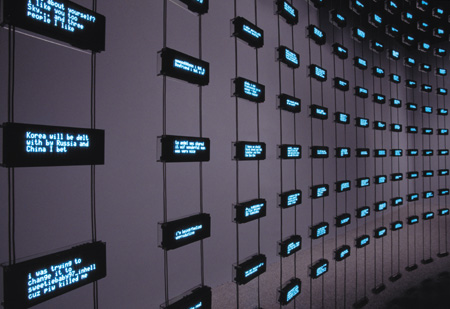User:Laura Macchini/notes/Graduation Proposal alpha
Graduation Proposal (alpha)
Context/Outline
Vitangelo Moscarda is the protagonist of 'One, No one and One Hundred Thousand', a novel by Luigi Pirandello; his story begins when one morning he wakes up and his wife points out that his nose bends a little to the right. Mr Moscarda comes to realize that the image that he has of himself does not corresponds to what other people see of him, that he has no control over how others see him: he freaks out. The only way to regain control is to completely destroy his personality and carefully build one that suits his liking. Inspired by Pirandello's story I started comparing Moscarda's crave for the perfect identity to our contemporary obsession for 'control over what we share'. The analogy seemed obvious. I'd like to research the topic of the 'Revision of Identity': the constant editing of our online profiles in order to perform every day our Best Self.
My idea is to create an installation that displays these changes in real time, possibly among my circle of friends, in order to show their constant re-shaping of identity. My focus would be on showing those elements of our online profiles that represent what we are, as opposedto least 'what we define ourselves asx.
In addition to this, I'd like to include some elements of ficton: as the characters of the novels I've been inspired by, I'd like to develop a fictional persona from scratch that I perform and have complete control over.
Relation to my previous practices
In my previous practice I've been fascinated by the role of the community in everyday online interactions: the community as a support for possible political change, or communities that unite people with similar interests. last year I did two projects that were one project, it has a very specific fascination about images and how do we communicate through images, which is relevant to what I'm doing right now: not only the images you share are interesting because of the connections between them (the way one puts together a collection), but I also find interesting what do these collections say about you.
Performing your best self
what images do you want to protect of yourself - what may be saying about about yourself might not be the same as what you want to project about yourself. There's a constant clash and the person you want to show you are and the person you ultimately are. You are trying to perform a person you are not, and you are ultimately a mixture of:
- the person you want to show you are, with the 'Ideal Self' in mind
- the person others perceive reading your written profile and interpretating your actions
How do these manifestations of identity make themselves visible?
- through the constant changes
- through the concept of plausibility
Plausibility
In order to perform our best self - which does not necessarily match what we are, because we want to look younger, or nicer, or better looking - we can either lie: post pictures that do not feature us, or report fake experiences; or we can photoshop: millions and millions of girls that have bigger boobs in their pictures than in real life- polished, perfect skin. There is a hidden force that pushes us to be prettier and blonder and skinnier than we are.
Aging of the profile
Mending and editing previous profiles, generates a history of changes that show the constant need to push oneself towards the Ideal. Visualizing this timeline of changes puts an interesting emphasis on the performative nature of the act, and makes evident the crave for improvement.
Anxiety
In Alone Together, Sherry Turkle talks about the peer pressure, among young people, to "be their best", in order to be as popular as possible. That creates anxiety, and anxiety that is not only characteristic of 15-year-olds, on the contrary is in everybody's life.
Project
Display this information in the sense of showing the constant editing - information on profiles are constantly changing to sound more appealing, or profile pictures, holiday pictures that are meant to say "I had a nice vacation" or "I went to an expensive place". I would take a sample group to examine, record a history of changes on their online profile and then show them on a screen (or projected, or whatever).
my biggest inspiration is : http://youtu.be/dD36IajCz6A
Listening Post, an installation by Ben Rubin and Mark Hansen
Notes
- performance of an Identity and what does it take to make an identity plausible / what does it take for you to look plausible in the eyes of others
- and how people try to perform their Best Self
- dating websites in which people try to put information on their profile that is going to attract the right person.
Questions?
- is the dating website thing relevant, or is it another subject entirely?
- what kind of sample group should I use? People I know or complete strangers? Would I be biased if they were not strangers?
- should the installation be showing a real-time history of changes, as opposed to a recorded history?
- is it interesting the idea of trying to create a fictional character, ideally indistinguishable from the rest of the sample group?
- should they all be fake?

